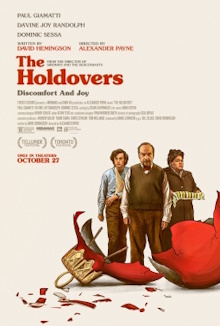Sideways was a surprisingly memorable film for me when I’ve forgotten many other good films and it seems to be a favorite of many others as well. So a second collaboration between Alexander Payne and Paul Giamatti was highly anticipated. Payne’s films are always wonderfully humanistic but perhaps lean a little too sentimental. This one I think gets the balance just right, being recognizably a Christmas film with all the schmaltz that implies, yet finding new ways to imbue it with meaning. He did have to set this in 1970 however as it would be unimaginable for a student in such a school to submit to a teacher like that in the present day.
At Barton Academy, a private boarding school, classics teacher Paul Hunham, is tapped by the headmaster to stay over the Christmas holidays to supervise the students who aren’t returning home. A bad tempered teacher who is disliked by everyone, Hunham is being punished for failing the son of a major donor. Five students are left behind by their families including one, Angus Tully, who was expecting to go on holiday to St. Kitts. With them is Maria Lamb, the school’s cafeteria manager who had recently lost her son, a former student at the school, in Vietnam. Forced to bunk together in the infirmary to save on heating, they have a hard time of it as Hunham insists that they study during the break. Then the father of one of the kids sends a helicopter to take his son on a ski trip and agrees to take the others as well. Hunham however is unable to contact Tully’s parents and so he is the sole student remaining. He learns that Tully’s mother had newly remarried and is avoiding him to be with her new husband. As they spend time together, Hunham reveals his own bitterness at being an unmarried bachelor from modest beginnings, resentful of the privileged rich kids at the school.
Right from the start, this is such a pleasant, comforting film to watch. It takes great pains to recreate the look and feel of the era, to the extent of bringing back the old logos of the production companies and even redesigning modern ones to match that look. Together with the Christmas season, the music and the privileged academic setting, this makes for an endearing throwback to a kinder, gentler era. Of course, Payne wastes no time in undermining this idyllic image. The students are all spoiled brats from rich families who take their privilege for granted. Hunham is a true expert in ancient history but lets his disdain for his students get in the way of being a good teacher. Hunham is a markedly different character from Miles in Sideways, but there are similarities in that both are unwanted by women due to their physical looks and are stuck as losers. Hunham, being older however, seems to have more or less made peace with his situation in life even as he remains embittered. He uses alcohol to help him get through the day but clearly isn’t the raging alcoholic that Miles was.
With the characters of Hunham and Tully, this has elements of a school movie, a buddy movie and a road trip movie. They do have decent chemistry together and both undergo meaningful character development over the course of the film. I’ve wondered from time to time about the enduring influence of Sideways and I believe it’s because Payne was way ahead of his time in identifying the crisis of male loneliness that is now so widely talked about. Crucially, his approach is sympathetic towards these men yet never descends into toxic masculinity. The Holdovers continues this line of exploration about a man who is now well past middle age and has never had a meaningful intimate relationship with a woman. He can’t help but resent the world at least somewhat for it yet he never turns into a misogynist and as this film shows he is still able to find meaning in his life. The gripes about the school and America in general still being the playground of the privileged white elite complement that message but is less original.
It’s a little silly perhaps but I do seem to have a soft spot for these preppy school movies and the fact that Payne manages to work this into a decent, contemporary Christmas movie is even better. Yet as I noted, it’s a film that could only work in that era. Nowadays with phones and computers available, I’d imagine that being held over during the holidays would be a completely different experience and some kids might even welcome it. As spoiled as the students shown here are, I’d imagine that they are far worse now and it would be near impossible for a teacher like Hunham to exert any meaningful authority over the scions of political and industry leaders. So yes, this was an effective and humanistic film but I’m afraid that even a scenario as bittersweet as this is too good to be true.
